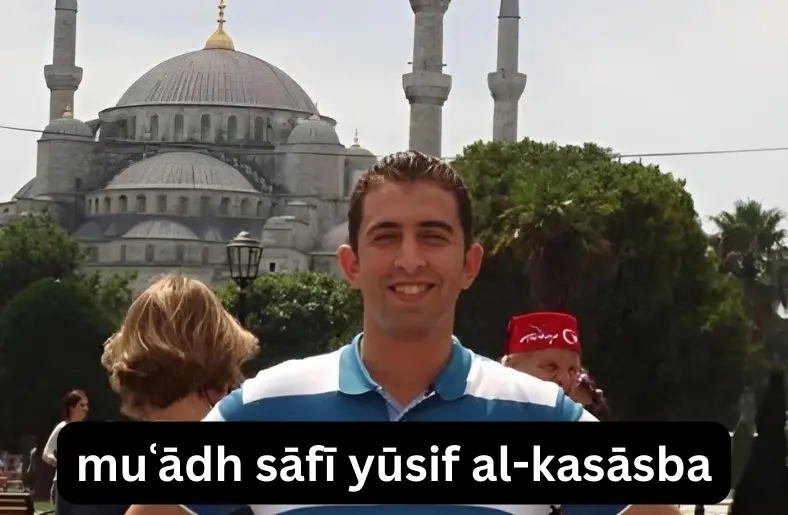Muʿādh Sāfī Yūsif al-Kasāsba story is a poignant tale of courage, sacrifice, and enduring legacy. Born in Jordan, he became a national hero whose life and tragic death highlighted the brutality of terrorism and the spirit of resilience. This blog post explores his life, the tragic events leading to his capture, and the lasting impact he has had on Jordan and the world.
Who Was Muʿādh Sāfī Yūsif al-Kasāsba?
Muʿādh Sāfī Yūsif al-Kasāsba was born on May 29, 1988, in Karak, Jordan. Growing up in a family with a strong military tradition, Muʿādh was inspired to serve his country from a young age.
Early Life and Background
Raised in Karak, Muʿādh was known for his dedication and sense of duty. He was part of the influential Bararsheh tribe, and his upbringing instilled in him a strong sense of patriotism. He was often seen playing with toy planes, dreaming of the skies.
Family and Education
Muʿādh was one of eight children. His father, a retired military officer, greatly influenced his aspirations. Muʿādh attended local schools in Karak, excelling in his studies and sports. His teachers often remarked on his leadership qualities and willingness to help others.
Military Career
Graduating in 2009 from the King Hussein Air College, Muʿādh joined the Royal Jordanian Air Force. His exemplary performance earned him a position as an F-16 pilot, and by 2012, he was recognized as a skilled and disciplined aviator. His colleagues admired his cool demeanor and quick thinking, especially during intense training missions.
Jordan’s Role in the Fight Against ISIS
Jordan, under King Abdullah II, played a crucial role in the international coalition against ISIS. The country provided logistical support, intelligence, and military personnel, with Muʿādh al-Kasāsba being an integral part of these efforts.
Background on Jordan’s Involvement
As a proactive member of the coalition, Jordan was committed to combating terrorism and restoring peace in the region. The nation’s strategic location and experienced military made it a key player in the fight against ISIS.
Muʿādh’s Mission and Role
On December 24, 2014, Muʿādh was on a mission targeting ISIS positions in northern Syria. His involvement was part of Operation Inherent Resolve, a crucial campaign against ISIS. Known for his precision and bravery, Muʿādh was flying high, literally and figuratively, on that fateful day.
The Capture
During a mission over Raqqa, Syria, Muʿādh’s F-16 jet went down, leading to his capture by ISIS militants.
Details of the Fateful Mission
Muʿādh’s plane encountered mechanical problems, resulting in a crash landing. Despite efforts by the U.S. to rescue him, Muʿādh was quickly taken captive by ISIS. The exact details remain unclear, with some reports indicating his jet was shot down, while others suggest mechanical failure.
Circumstances of Capture
After ejecting from his aircraft, Muʿādh landed in a lake near Raqqa, Syria, but his ordeal had only just begun. He was captured by ISIS militants, who swiftly pulled him from the water.
The World’s Reaction
Muʿādh’s capture and subsequent execution sparked a global outcry.
Initial Shock
The news of his capture shocked Jordan and the international community, with many hoping for his safe return. Social media buzzed with calls for his release, and candlelight vigils were held in his honor.
International Outcry and Support
World leaders and organizations condemned ISIS’s actions and expressed solidarity with Jordan, highlighting the brutality of the extremist group. International support poured in, emphasizing the need for a united front against terrorism.
The Horrific Execution
On February 3, 2015, ISIS released a video showing Muʿādh being burned alive, a horrific act that was widely condemned.
ISIS’s Propaganda
ISIS used the video as a propaganda tool to instill fear and showcase their ruthlessness. The video was intended to demoralize coalition forces and assert their power, but it backfired by uniting the world against them.
Global Condemnation
The video drew widespread outrage and condemnation, emphasizing the need for a united front against terrorism. Leaders from around the world denounced the act, calling it a heinous crime against humanity.
Jordan’s Response
In the wake of Muʿādh’s execution, Jordan responded with a series of actions to honor his sacrifice and combat terrorism.
National Mourning
The country mourned deeply, with King Abdullah II cutting short a visit to the U.S. to address the nation. The streets of Jordan were filled with people paying their respects, and the atmosphere was one of somber unity.
Military Retaliation
Jordan launched a series of airstrikes against ISIS, demonstrating their resolve to fight back and honor Muʿādh’s memory. The operations, named “Operation Martyr Muath,” were a fierce retaliation, targeting ISIS strongholds.
A Symbol of Resistance
Muʿādh’s tragic death turned him into a symbol of resistance against oppression and extremism.
His bravery and sacrifice resonated with people worldwide, inspiring many to stand against terrorism. His story became a rallying cry for those fighting for justice and peace.
Muʿādh’s story has been immortalized in books, films, and artwork, ensuring his legacy lives on. His name became synonymous with courage and defiance against evil.
Honoring Muʿādh’s Legacy
Various memorials and tributes in Jordan and beyond commemorate Muʿādh.
His sacrifice is commemorated by naming streets, schools, and institutions in his honor. Statues and plaques commemorate his bravery, and annual events celebrate his life and legacy.
His story continues to inspire new recruits and members of the armed forces, reinforcing the values of courage and patriotism. Military training and ceremonies often cite his example, motivating soldiers to uphold the highest standards of service.
Lessons from Muʿādh’s Story
Muʿādh’s life and sacrifice teach us important lessons about bravery, unity, and resilience.
His willingness to face danger head-on is a powerful example of true bravery. Muʿādh’s story reminds us that real courage often comes with great personal risk.
Muʿādh’s story underscores the importance of standing together in the face of adversity. His legacy has brought people together, fostering a sense of solidarity and shared purpose.
Conclusion
Muʿādh Sāfī Yūsif al-Kasāsba’s legacy is one of extraordinary bravery and selflessness. His story continues to inspire and remind us of the importance of courage and unity in the ongoing fight against terrorism. Remembering his sacrifice encourages us to stand together against hatred and violence, ensuring that his legacy lives on in our collective fight for justice.





